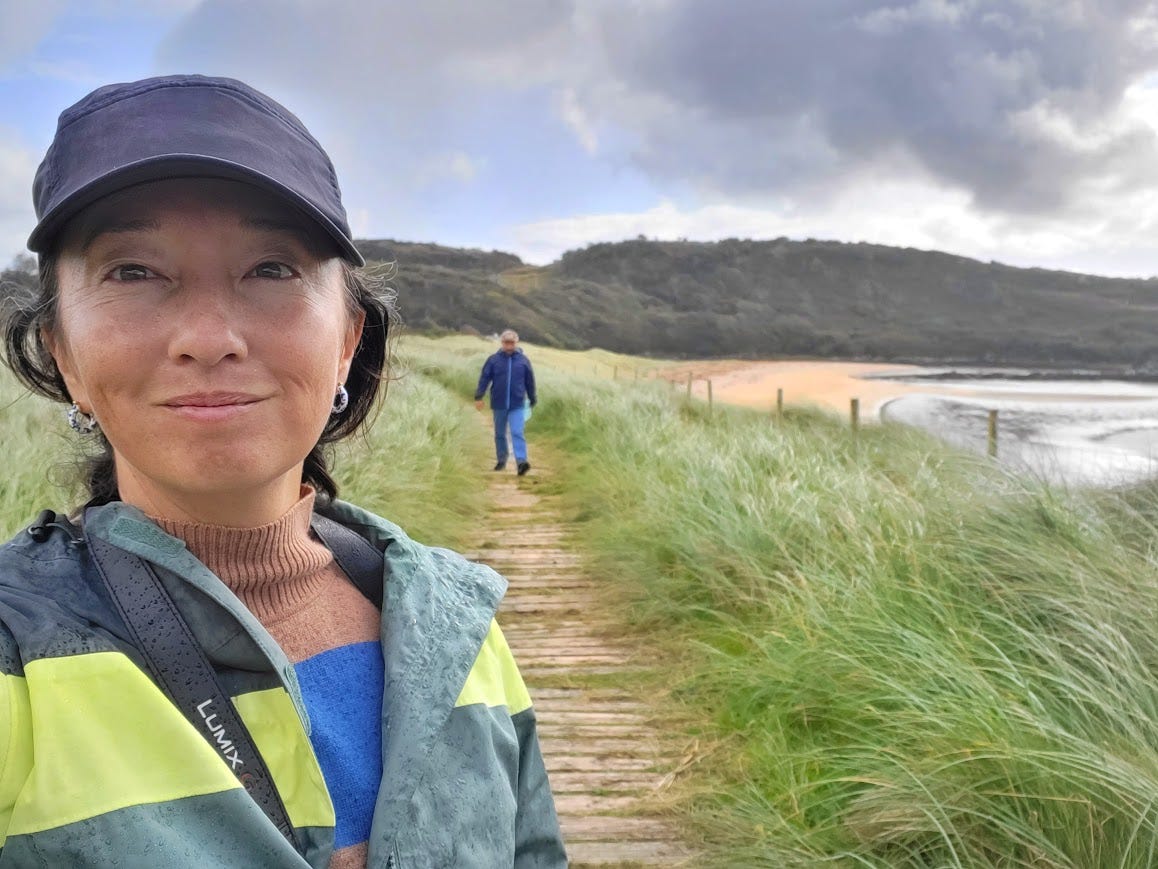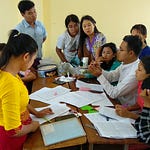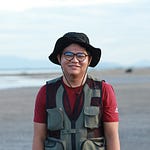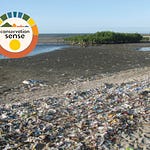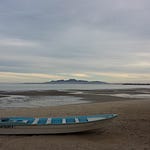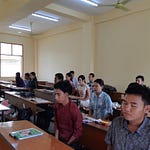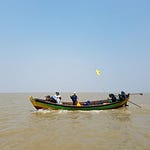Welcome to Conservation Realist! I’m Dr. Tara Sayuri Whitty, and I am so glad you’re listening (or reading the transcript). As I record and post this, it’s the day after Christmas, and so I wish you all a restful interlude and time for reflection as the year ends and 2024 begins.
Speaking of interludes… this is the last episode of Conservation Realist for this first season (whatever it is I mean by “season”). I’d hoped to feature a chat with my brother, nonspeaking autistic advocate and writer Danny Whitty, but he has been really struggling recently and is needing to focus on getting himself rested and feeling okay again. He’s okay with me sharing this - these difficult times are characterized by what is called “dysregulation,” an intense anxiety that takes over his body and, in his case, is manifested in exacerbated OCD, restlessness and sleeplessness, and unpredictable flare-ups into agitation. It’s awful to witness, but of course not nearly as awful as it must be for him to be going through it in his own mind and body. It’s a brutal reality that he and millions of others – and their families and care teams – experience regularly. But it’s not spoke about very widely.
I think that my experiences with my brother and my experiences in conservation have beautifully informed each other in an interactive and ongoing way. I’ve always been interested in knowing more about those who are overlooked, in extending compassion to those who are marginalized, because of my brother. That’s just how I grew up The way that autistic folks are so badly failed, in many ways, by the medical field and education “experts” has informed my own nuanced view of “expertise,” which holds that trained expertise certainly is valuable (I mean, I did spend a lot of energy getting a PhD!), but it is too often wielded as evidence of absolute superiority at the expense of continued humility and curiosity in inquiry. And I feel like “experts” should be experts in learning, in inquiry, and that side of it is too often replaced by ego.
Even before my brother could communicate, it was obvious that he was underestimated, overlooked, and seen as an inconvenience to be pitied when people wanted to feel good about themselves being charitable – and though I also underestimated him, and made a lot of mistakes in that regard, I still knew that he had a right to so much more than what society offered. It instilled in me a tenacity for standing up for the underdog. And it also instilled in me a skepticism of widely-held, but not often-questioned, beliefs and behaviors of society in general. In short, I often can spot bullshit pretty well, and I have no patience for it.
And my experiences in the field, learning on the go through interviews with diverse folks, and learning from friends in the social sciences (and some fantastic resources), helped me tap into the art of listening without judgment. Well, that’s a bit of an exaggeration, because a part of me would often form judgments! But I worked hard to cultivate a mindset of “well, let’s see what this person has to say, and how that might relate to their own lived experiences and perspectives, and what I can learn from that.” It trained me to also be mindful of my own biases and assumptions, to be aware of the filter that I brought to each interview, and to put my ego aside and be present to what was being said in the moment (or, in many cases, to what I read from the interview notes compiled by my field teams).
Training my field teams was also something that I found I truly enjoyed doing – observing the obvious strengths and interests of each individual, as well as assessing relative weaknesses and thinking mindfully of how to play to their strengths while also supporting growth in the weaker skill areas. This blossomed when I worked with IUCN in Myanmar, training not only the wonder team at Myanmar Coastal Conservation Lab, but also cohorts of faculty and students at universities there. I wanted to share skills in a way that was actually effective, out of respect for my colleagues who were receiving the training, and also my low tolerance for, again, bullshit. If we’re saying we’re going to do something, let’s really do it in a way that matters!
These skills in listening in the field and in fostering the best in my teams have been so very helpful for me in being an ally to my brother, in being his communication partner and in mentoring him through his career, and also in being a practitioner of Spelling to Communicate (the method my brother uses) with other nonspeaking clients. My experience in the field has informed my work as a support person to nonspeakers, fostering again that mindfulness of what I’m bringing with me to the experience and how that colors my perception, a readiness to learn something new and be surprised by people, and a belief in their potential, as well as really putting ego aside.
And I believe that these skills belong in every sector, and that we need to be integrating them into how we train experts and practitioners in every field. My dual careers – a somewhat odd combination – have shown me in a tangible way that many of the things that are needed for a more mindful, ethical, effective future for conservation, are also needed for improved disability rights… and in humanitarian work, and in public health, and in education, and on and on. These skills in what I call “human processes” are so missing in how we train conservationists these days, and that’s something I want to contribute to.
So, that’s really going to drive the next season of Conservation Realist in 2024. I’ll likely resume in the spring sometime, which might be fun (and/or impractical?) because I have some field travel (for the first time in 4 years!) coming up then. Maybe I can record some dispatches from the ground. But really, what I want this next season to focus more on is training. I envision less of a focus on interviews – but will still have them periodically, because I love learning from them – and more on a greater variety of episodes, including: specific, practical topics, paired with more “deep dive” training seminars, which will likely be on a paid basis (the podcast intro will be free, the training will be priced flexibly to be widely accessible but financially feasible for me); my monologues on ideas that I find exciting and interesting, including more exploration of the notions of “expertise” and inclusion (possibly paired with paid, in-depth, researched newsletter posts); advice for younger researchers, including answers to questions I’m often asked about career paths, and also some insights about mental and emotional health and financial security in this field; and selected interviews, because I love them.
I know that this podcast is quite modest in reach (though I’m actually surprised by how many Substack subscribers have signed up). I definitely don’t aspire to any kind of limelight, but it’s definitely important to me that certain ideas are paid attention to. So continuing into a 2nd season is certainly not an exercise in ego, but rather my outlet for getting ideas out there as I continue to expand my work with nonspeakers, and thus continue to reduce the time I spend in conservation. I aspire to having some training programs developed and online next year, and so the 2nd season will be the transition into that. I would love to hear your suggestions and requests for topics to cover in trainings, or in any of the future episodes!
Truth be told, I’m pretty burned out (I think many of us probably are around this time of year). I know I didn’t need to put out this episode this week, and I know I really didn’t have to do this whole Conservation Realist thing at all! In many ways, it was an impractical thing to do with how busy I ended up with so many other things. But I felt so driven to do it, and I’m very proud to have finished this first season, albeit several months later than planned! Life as a freelance consultant and as a support person is unpredictable, let’s just say that. I started 2023 having been in an amorphous transition period since leaving work in Myanmar, existing through the pandemic, and changing my life direction drastically because of my work with my brother. I barely earned any money in 2020, as I was focusing almost entirely on my brother’s growth and because the pandemic really put a damper on work opportunities. I didn’t even know if I could turn my consulting business into a sufficient income source, and I felt so out of sorts living a very different life than I’d previously envisioned, and I sort of flailed and faltered around for a bit. My sense of my life and my sense of me, as a person, felt very shaky.
This was the year when I really came back strong. My consulting business continues to grow, I earned a certification as a Spelling to Communicate practitioner and now work with several clients in the life-transforming building of communication skills, I’ve supported Danny’s continued growth, I’ve even become a better surfer, and I feel very fulfilled and happy despite the fatigue and tough times. And this podcast is definitely something that I’m proud of. The idea had been in my mind for years, and I finally gathered enough executive function together to do it!
I realize that this was a rather self-indulgent episode, but it’s because I want to convey where much of the ethos of this podcast is rooted, and also to lead to this: my very sincere appreciation for all of you listening, for all who have sent me kind messages about this, for all who have shared time with me in interviews, and for all who have liked, shared, commented, and even donated. I was very shy about putting this out into the world, and you’ve made me feel so encouraged. I hope that this podcast has brought you some new ideas and information, some intriguing perspectives, and some motivation and encouragement in your own work and lives.
Okay, I need to pack for a trip that starts tomorrow (am I doing this episode as procrastination? Perhaps!). Wishing you all a very happy new year! Until sometime in 2024! (Reminder: subscribe and/or follow on Instagram for updates on the triumphant return of Conservation Realist, and hey, you can still share old episodes in the meantime!)
I’ll send you off with the song the Green Touch, a beautiful song written and performed for this podcast by Soe Moe Thwin, Zyan Htet, and Min Min in Myanmar. Thank you again, and take care!



